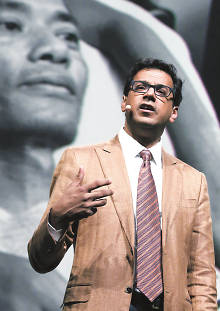Clinicians Should Talk to Patients About End-of-Life Goals
Abstract
People have goals in life other than living longer, and they should be prompted to talk about them, advises noted surgeon and author Atul Gawande, M.D., M.P.H.
“Well-being is more than health,” noted surgeon and author Atul Gawande, M.D., M.P.H., at the Opening Session of APA’s 2016 Annual Meeting last month. Gawande, whose latest book is Being Mortal: Medicine and What Matters in the End, discussed the problematic relationship that American medicine has tended to have with death and dying.

Atul Gawande, M.D., M.P.H., tells psychiatrists that people value a feeling of positive well-being more than they do health.
Gawande said patients, their families, and clinicians usually come to late-life and end-of-life care decisions utterly unprepared to answer the important questions: What do patients want and don’t want as they near the end of their lives? How much care is too much? What is the minimal quality of life patients are willing to endure in exchange for a longer life?
“When it comes to these kinds of conversations, it is always too early until it is too late,” he told psychiatrists at the meeting. “Our difficulty with these issues is directly related to our own anxiety about our mortality.”
Speaking in an impromptu fashion, Gawande described the research he did for writing Being Mortal—talking to geriatricians, palliative care physicians, psychiatrists, and other clinicians as well as patients and their families.
A first lesson, he said, is that human beings’ experience of their own life tends to get better as they age, even as their health declines in medical terms. “Our standard image of growing old is that it’s a total drag,” Gawande said. “But the reality is that our well-being is larger and means more than our health.”
A second and related lesson is that people have goals and priorities as they age other than living longer. The way to learn what these goals and priorities are, he said, is to use “that highly technical skill that you as psychiatrists use every day—ask patients and listen to them.”
Gawande said a body of research is emerging showing that certain interventions can improve palliative and end-of-life care and focus medical treatment around patients’ goals and priorities. He said reforms in medical treatment and delivery are helping American physicians to rediscover the skills of talking to patients about their goals as they age. He described a recent study at Massachusetts General Hospital in which cancer patients were given expert palliative-care consultation early in their treatment. The patients were happier with their care, experienced less anxiety and depression, and were less likely to get aggressive medical care. They also lived longer than patients who received only standard cancer care.
He also described work at the Dana Farber Cancer Institute in which physicians were given a checklist of questions to discuss with their patients regardless of the stage of cancer treatment they were in—the same questions that physicians have traditionally been reluctant to pose to their patients: What is your own understanding of your health? What are you willing to go through to gain more time to live? What are your goals and priorities?
Results showed that patients who underwent this intervention experience significantly less anxiety and depression, Gawande said.
Ultimately, he said, talking with patients about death is about talking with them about life—and what it means to them.
“When our technology and procedures are divorced from meaning, we actually reduce well-being,” he said. “The skills that you as psychiatrists use every day—talking to patients about meaning in their lives and listening to them—are being rediscovered.” ■



